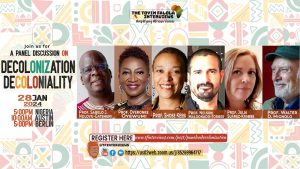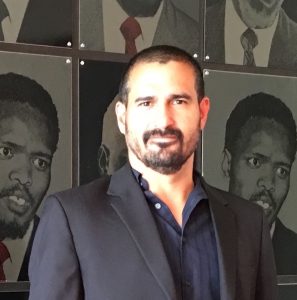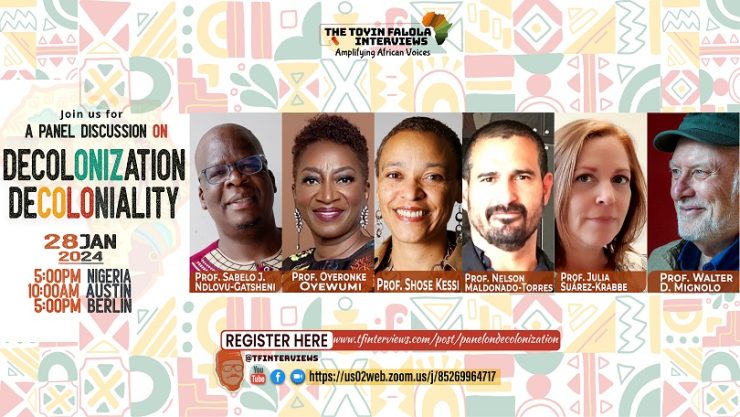A PANEL DISCUSSION ON DECOLONIZATION/DECOLONIALITY, PART 2

PART 2
Decoloniality
Toyin Falola
Is decoloniality different from decolonization? I cannot wait to ask the distinguished panelists this important question. Coloniality, as I present it here, refers to the set of values, ideas, and attitudes imposed on other groups/societies as part of the attempt to create a universal system. Decoloniality, therefore, refers to the reversal of this imposition and mindset to integrate the ideas of groups/societies that have been pushed to the margins.
Vivid from this analogy is the understanding that the domination of the world by Europeans has helped ingrained an orientation that European values and standards are universal ethos to be embraced everywhere and by everyone. No one advertised this Eurocentric sentiment, and neither was there an open forum for its adoption. Rather, the comparative advantage of domination enjoyed during colonialism provided a platform to introduce and institutionalize these values.
The concept of decoloniality suggests the process of delinking from established Eurocentric knowledge hierarchies and models. Some even regard it as a “social movement” as well as an academic weapon launched to enhance the repudiation of universalist ideas that operate with the intention to fumigate other ideas from existence. Frontline ideologues of decoloniality are convinced that the problems associated with coloniality were set in motion during colonialism, and for that reason, they seek to thwart such agenda by interrogating the institutions and values that were introduced during colonialism. It is believed that the initiation of coloniality was expressed in institutions introduced by Europeans, even if they were not suited to Africa’s needs.
Therefore, it is believed that the interference of coloniality has activated the repositioning of the colonized ideas and thinking in such a way that their understanding of progress and development has been affected. Since many ex-colonized countries have experienced European attitudes and values, they have also internalized the associated values, and for that reason, they are conditioned to think only in colonial ways. In essence, when they want to talk about development, they use only the Western countries as their yardstick. Such orientation poses a greater danger to the emancipation of the ex-colonized people, who can be described as an extension of Euro-North American-centric modernity. For instance, from a socio-ideological standpoint, arguments, postulations, policies, and values have recently tilted towards capitalist models, and this was facilitated by the awareness that the Western world operates under that formula.

Photo: Professor Walter Mignolo
Decoloniality, therefore, seeks to challenge and exterminate the foundation of such a mindset as it opines that such thinking would never allow the true emancipation of the people. The awareness and protest about capitalism and its attendant values antagonizing the progress of the ex-colonized people is that which is manifested as decoloniality. This concept is informed by the understanding that the adoption of such values will create a different human bonding as experienced in the European environment where the system is practiced. Thus, decoloniality is interested in creating a system that works and is free from the shackles of ideological suppression, which coloniality indicates.
As an extension of the prognosis of coloniality, it is the case that the knowledge that ex-colonized ones believed they have is a byproduct of the European system, which, at the surface, invalidates all indigenous knowledge systems and, at the deeper level, repositions their epistemic traditions to the margin. It has been argued that the universal idea of knowledge is that it can only happen in the context of modern Europe, and by this configuration, all other knowledge systems are minimized. Meanwhile, there was not a time in human history when knowledge and ideas were stopped from being consumed. This, therefore, raises the question that if people are being fed with some ideas, who determines the contents?

Photo: Professor Oyeronke Oyewumi
Any response that downplays the place of Europeans in determining what knowledge is about does not give an accurate account of reality. This is underscored by the awareness that the institutions put in place by colonizing forces have ensured that the colonization of alternative perspectives is effective and ongoing. Can Western science be considered the only educational process where the truth about occurrences in the world can be accessed? To that extent, the decoloniality of knowledge is necessary to emancipate the subaltern groups from being perpetually trapped in the colonial configurations. Even some of the ex-colonized intellectuals do not always recognize alternative knowledge production as valid and would negate sources of information that do not embrace Western methodologies. The decoloniality of knowledge would, therefore, bring about the validation of universalist perspectives such that information that is produced elsewhere would be validated and adopted.

Photo: Professor Julia Suárez-Krabbe
Decoloniality also becomes necessary in the economic domain, as it was apparent in post-independence, such that regardless of the efforts of the ex-colonized people, their opportunities for economic buoyancy were impeded by the available systems already put in place by the colonizers. The capitalist illusion that labor work would produce a financially free citizenry has increased the agitation of the people who now believe that it is impossible to attain their expected financial freedom with the presence of colonial institutions everywhere.

Photo: Professor Nelson Maldonado-Torres
Economic growth is important to the advancement of every group across the world, but that growth cannot be possible under a system where repressive ideologies have been installed for a long period. The fact that a few ex-colonized countries still battle with stunted economic growth is occasioned by the form of economic systems that they have embraced. Decoloniality scholars, therefore, challenge the thinking that the Westphalian economic models can ultimately bring people out of their economic problems. They believe that by rejecting the economic models introduced by colonial society, ex-colonized groups would use their indigenous economic knowledge to revitalize their economy and bring emancipation, especially financially. From this angle, one notices that decoloniality seeks to disallow the continued enervation of people’s systems enhanced by the operation of systems that the colonizers have imposed in different countries. Decoloniality at this point is undergirded by the principles of freedom that would ultimately bring about the emancipation of others away from the traps of universalist agenda.

Photo: Professor Shose Kessi
The proposal of decoloniality is the removal, reversal, and rejection of colonial ideas to be achieved through the unlearning and re-learning of ideas the people have been conditioned to see as a basic or universal system of engagement. The systems and structures, institutions and practices of ex-colonized people that have been abandoned are meant to be reconsidered in a decolonial environment. In essence, it is the process by which formerly colonized people bring to the center the alternative perspective that they offer across different areas of engagement.
It should be stated that decoloniality does not seek to reject the approaches and alternatives offered by Western institutions but to comprehend their validity and limitations while also agreeing that they can be flanked by other sources of knowledge as recognized by different peoples of the world. In essence, decoloniality argues for the flexibility of knowledge and the fluidity of approaches. By doing this, decoloniality helps reveal the dark side of modernity by identifying areas and ways by which it has compromised different people and their knowledge systems. Once this is done successfully, it is believed that the Eurocentric notion of universalism will be deconstructed and stripped of its dominant culture. It would enable the ex-colonized people to see how ordinary and unnatural the approaches and systems of Western making have been considered for long. Decoloniality differs from decolonization as in the latter; it is assumed that colonizing forces did not stop in their track of domination and oppression but have only used the global influence they have to recondition the mindset of people to accept only universalist ideas. This is what the decolonial thinkers challenged aggressively in the first place.

Photo: Professor Sabelo Ndlovu-Gatsheni
To discuss decolonization, please join us for a panel discussion with our distinguished panelists, Professors Julia Suárez Krabbe, Nelson Maldonado-Torres, Walter Mignolo, Sabelo J. Ndlovu-Gatsheni, Oyeronke Oyewumi, and Shose Kessi.
Sunday, January 28, 2024
5 PM Nigeria
10 AM Austin
5 PM Berlin
Register and Watch:
https://www.tfinterviews.com/post/panelondecolonization
Join via Zoom:
https://us02web.zoom.us/j/85269964717














You must be logged in to post a comment.